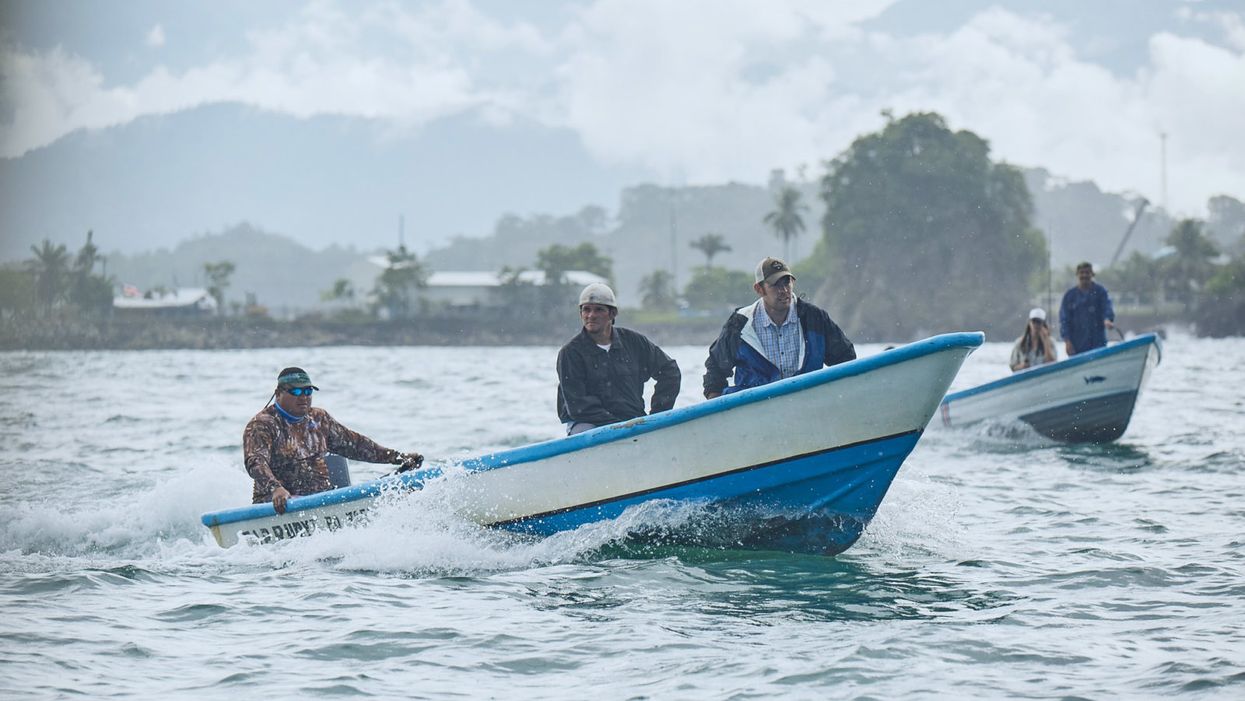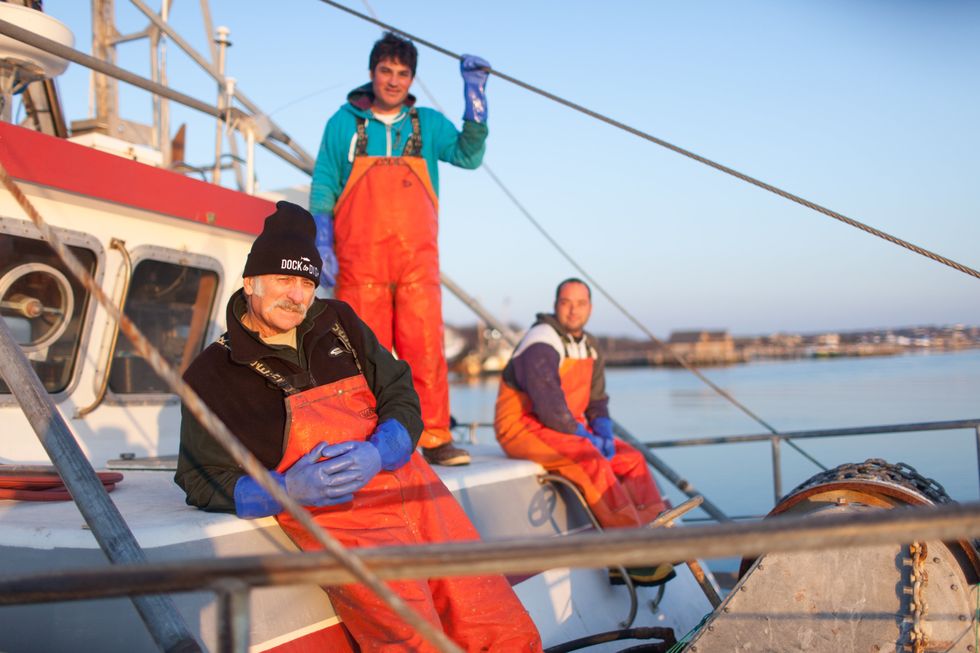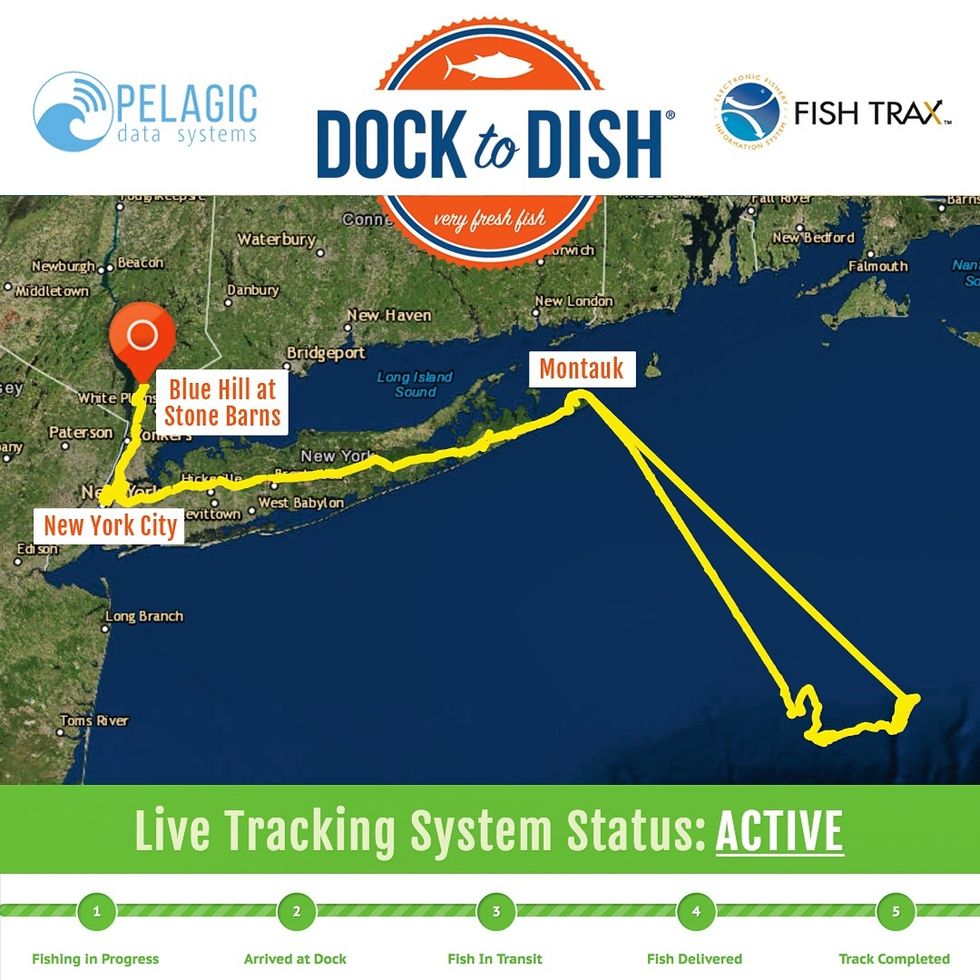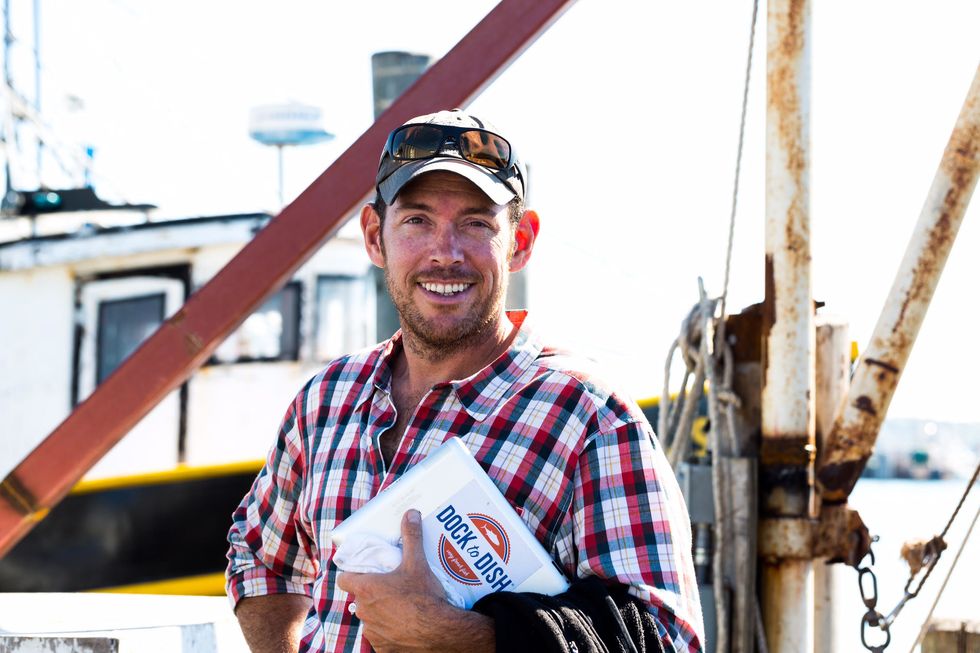Wild-Caught Seafood Has Been Notoriously Shady – Until Now

The Dock to Dish model has expanded across North and Central America. Above, artisanal fishermen on the Pacific coast of Costa Rica head out to sea seeking schools of abundant forage fish to supply the program.
In 2012, entrepreneur Sean Barrett founded Dock to Dish in Montauk, New York. It connected local fishermen and women with local chefs, enabling the chefs to serve hyper-fresh seafood – with the caveat that they didn't know what would be on their menus until it arrived in their kitchens the night before.
"Since we're not a seafood-centric culture, people don't know what's what, where fish are from, and when they're in season, making them easy to dupe."
In June of 2017, The United Nations Foundation designated Dock to Dish as one of the top breakthrough innovations that can scale to solve the ocean's grand challenges. His company has since expanded across the Americas and has just opened up shop in Fiji. Leapsmag recently chatted with Barrett about his inspirations and ideas for how to overcome the hurdles of farming wild seafood. This interview has been edited and condensed for clarity.
What inspired you to start Dock to Dish?
The short story is "A Tale of Two Hills."
The first is Quail Hill Farm in Amagansett. I grew up in the commercial fishing port of Chinicock in the 1980's and 90's, working on my family's dock from an early age and in the restaurant industry in my teens. By my thirties, I had accrued my 10,000 hours of experience in both dock and dish. I watched the food system shift from local to global, especially in seafood. By the early 2000's, over 90 percent of seafood in the U.S. was imported. It was bad.
Quail Hill was the first CSA [Community Supported Agriculture, in which customers pay up front for a share in whatever crops grow (or don't) on the farm that season] in the U.S., founded in 1990. So people in the area were accustomed to getting their produce that way. Scott Chaskey, the poet farmer at Quail Hill, really helped crystallize the philosophy for me and inspired me to apply it to seafood. Fishermen had always been bringing a share of their day's catch to their neighbors; now we were just doing it in a more formalized way.
The second is Blue Hill at Stone Barns. [Executive chef and co-owner] Dan Barber literally trademarked the phrase "Know Thy Farmer"; we just expanded it to Know Thy Fisherman and it took off like a rocket ship. His connections in the restaurant world were also indispensable.

17th generation Montauk fisherman Captain Bruce Beckwith (above left) with crew Charlie Etzel (Center) and Jeremy Gould (right).
Do you have any issues that are unique to seafood that a CSA or meat co-op wouldn't face?
This food is WILD. People are totally disconnected from what that word means, and it makes seafood different from everything else. Everything changes when viewed through the prism of that word.
This is the last wild food we eat. It is unpredictable, and subject to variables ranging from currents and tides to which way the wind is blowing. But it is what makes our model so much more impactful and beneficial than the industrialized, demand-driven marketplace that surrounds us. The ocean and its ecosystem are the boss, not chefs and consumers.
There has a been a lot of press about seafood being mislabeled. How and why does that happen? Can Dock to Dish fix it?
Imported, farmed seafood is cheap. Wild, sustainable seafood is not. People are buying low and selling high to make a buck; and while fisheries are extraordinarily regulated, the marketplace isn't. There is no punishment for mislabeling, and no means to correct it. Since we're not a seafood-centric culture, people don't know what's what, where fish are from, and when they're in season, making them easy to dupe. But technology is poised to fix that; DNA testing can test what a fish sample is and where it's from, and SciO handheld spectrometers – soon to be incorporated into smartphones – can analyze the molecular makeup of anything on your plate.
We've created the first ever live tracking system and database for wild fisheries. It is similar to the electronic system used to monitor commercial fisheries, thanks to which the resurgence of wild seafood in U.S. waters is a model for the rest of the world. We have vessel tracking devices on our fishing boats and delivery vans, so the path of each fish is publicly available in real time.

In 2017, Dock to Dish launched the world's first live "end-to-end" tracking system for wild seafood, which provides full chain transparency and next-generation traceability for members.
People are increasingly looking to seafood as a healthier, possibly more sustainable protein option than meat. Can Dock to Dish scale up to accommodate this potentially growing market?
Nope. We can't scale; the supply is finite. That's why the price keeps going up. To avoid becoming "fish for the rich" we are working closely with Greenwave.org to create a network of 3D restorative ocean farms growing kelp and shellfish, which sequester carbon and nitrogen out of the air and soil. Restorative, because sustainable is no longer an option. In fifty years, a plate of seafood will be mostly ocean vegetables with a small amount of finfish as a garnish.
The upcoming vaccine is changing the way we look at treating one of the country’s deadliest cancers.
Last week, researchers at the University of Oxford announced that they have received funding to create a brand new way of preventing ovarian cancer: A vaccine. The vaccine, known as OvarianVax, will teach the immune system to recognize and destroy mutated cells—one of the earliest indicators of ovarian cancer.
Understanding Ovarian Cancer
Despite advancements in medical research and treatment protocols over the last few decades, ovarian cancer still poses a significant threat to women’s health. In the United States alone, more than 12,0000 women die of ovarian cancer each year, and only about half of women diagnosed with ovarian cancer survive five or more years past diagnosis. Unlike cervical cancer, there is no routine screening for ovarian cancer, so it often goes undetected until it has reached advanced stages. Additionally, the primary symptoms of ovarian cancer—frequent urination, bloating, loss of appetite, and abdominal pain—can often be mistaken for other non-cancerous conditions, delaying treatment.
An American woman has roughly a one percent chance of developing ovarian cancer throughout her lifetime. However, these odds increase significantly if she has inherited mutations in the BRCA1 or BRCA2 genes. Women who carry these mutations face a 46% lifetime risk for ovarian and breast cancers.
An Unlikely Solution
To address this escalating health concern, the organization Cancer Research UK has invested £600,000 over the next three years in research aimed at creating a vaccine, which would destroy cancerous cells before they have a chance to develop any further.
Researchers at the University of Oxford are at the forefront of this initiative. With funding from Cancer Research UK, scientists will use tissue samples from the ovaries and fallopian tubes of patients currently battling ovarian cancer. Using these samples, University of Oxford scientists will create a vaccine to recognize certain proteins on the surface of ovarian cancer cells known as tumor-associated antigens. The vaccine will then train that person’s immune system to recognize the cancer markers and destroy them.
The next step
Once developed, the vaccine will first be tested in patients with the disease, to see if their ovarian tumors will shrink or disappear. Then, the vaccine will be tested in women with the BRCA1 or BRCA2 mutations as well as women in the general population without genetic mutations, to see whether the vaccine can prevent the cancer altogether.
While the vaccine still has “a long way to go,” according to Professor Ahmed Ahmed, Director of Oxford University’s ovarian cancer cell laboratory, he is “optimistic” about the results.
“We need better strategies to prevent ovarian cancer,” said Ahmed in a press release from the University of Oxford. “Currently, women with BRCA1/2 mutations are offered surgery which prevents cancer but robs them of the chance to have children afterward.
Teaching the immune system to recognize the very early signs of cancer is a tough challenge. But we now have highly sophisticated tools which give us real insights into how the immune system recognizes ovarian cancer. OvarianVax could offer the solution.”
How sharing, hearing, and remembering positive stories can help shape our brains for the better
Across cultures and through millennia, human beings have always told stories. Whether it’s a group of boy scouts around a campfire sharing ghost stories or the paleolithic Cro-Magnons etching pictures of bison on cave walls, researchers believe that storytelling has been universal to human beings since the development of language.
But storytelling was more than just a way for our ancestors to pass the time. Researchers believe that storytelling served an important evolutionary purpose, helping humans learn empathy, share important information (such as where predators were or what berries were safe to eat), as well as strengthen social bonds. Quite literally, storytelling has made it possible for the human race to survive.
Today, neuroscientists are discovering that storytelling is just as important now as it was millions of years ago. Particularly in sharing positive stories, humans can more easily form relational bonds, develop a more flexible perspective, and actually grow new brain circuitry that helps us survive. Here’s how.
How sharing stories positively impacts the brain
When human beings share stories, it increases the levels of certain neurochemicals in the brain, neuroscientists have found. In a 2021 study published in Proceedings of the National Academy of Sciences (PNAS), Swedish researchers found that simply hearing a story could make hospitalized children feel better, compared to other hospitalized children who played a riddle game for the same amount of time. In their research, children in the intensive care unit who heard stories for just 30 minutes had higher levels of oxytocin, a hormone that promotes positive feelings and is linked to relaxation, trust, social connectedness, and overall psychological stability. Furthermore, the same children showed lower levels of cortisol, a hormone associated with stress. Afterward, the group of children who heard stories tended to describe their hospital experiences more positively, and even reported lower levels of pain.
Annie Brewster, MD, knows the positive effect of storytelling from personal experience. An assistant professor at Harvard Medical School and the author of The Healing Power of Storytelling: Using Personal Narrative to Navigate Illness, Trauma, and Loss, Brewster started sharing her personal experience with chronic illness after being diagnosed with multiple sclerosis in 2001. In doing so, Brewster says it has enabled her to accept her diagnosis and integrate it into her identity. Brewster believes so much in the power of hearing and sharing stories that in 2013 she founded Health Story Collaborative, a forum for others to share their mental and physical health challenges.“I wanted to hear stories of people who had found ways to move forward in positive ways, in spite of health challenges,” Brewster said. In doing so, Brewster believes people with chronic conditions can “move closer to self-acceptance and self-love.”
While hearing and sharing positive stories has been shown to increase oxytocin and other “feel good” chemicals, simply remembering a positive story has an effect on our brains as well. Mark Hoelterhoff, PhD, a lecturer in clinical psychology at the University of Edinburgh, recalling and “savoring” a positive story, thought, or feedback “begins to create new brain circuitry—a new neural network that’s geared toward looking for the positive,” he says. Over time, other research shows, savoring positive stories or thoughts can literally change the shape of your brain, hard-wiring someone to see things in a more positive light.How stories can change your behavior
In 2009, Paul Zak, PhD, a neuroscientist and professor at Claremont Graduate University, set out to measure how storytelling can actually change human behavior for the better. In his study, Zak wanted to measure the behavioral effects of oxytocin, and did this by showing test subjects two short video clips designed to elicit an emotional response.
In the first video they showed the study participants, a father spoke to the camera about his two-year-old son, Ben, who had been diagnosed with terminal brain cancer. The father told the audience that he struggled to connect with and enjoy Ben, as Ben had only a few months left to live. In the end, the father finds the strength to stay emotionally connected to his son until he dies.
The second video clip, however, was much less emotional. In that clip, the same father and son are shown spending the day at the zoo. Ben is only suggested to have cancer (he is bald from chemotherapy and referred to as a ‘miracle’, but the cancer isn’t mentioned directly). The second story lacked the dramatic narrative arc of the first video.
Zak’s team took blood before and after the participants watched one of the two videos and found that the first story increased the viewers’ cortisol and oxytocin, suggesting that they felt distress over the boy’s diagnosis and empathy toward the boy and his father. The second narrative, however, didn’t increase oxytocin or cortisol at all.
But Zak took the experiment a step further. After the movie clips, his team gave the study participants a chance to share money with a stranger in the lab. The participants who had an increase in cortisol and oxytocin were more likely to donate money generously. The participants who had increased cortisol and oxytocin were also more likely to donate money to a charity that works with children who are ill. Zak also found that the amount of oxytocin that was released was correlated with how much money people felt comfortable giving—in other words, the more oxytocin that was released, the more generous they felt, and the more money they donated.
How storytelling strengthens our bond with others
Sharing, hearing, and remembering stories can be a powerful tool for social change–not only in the way it changes our brain and our behavior, but also because it can positively affect our relationships with other people
Emotional stimulation from telling stories, writes Zak, is the foundation for empathy, and empathy strengthens our relationships with other people. “By knowing someone’s story—where they come from, what they do, and who you might know in common—relationships with strangers are formed.”
But why are these relationships important for humanity? Because human beings can use storytelling to build empathy and form relationships, it enables them to “engage in the kinds of large-scale cooperation that builds massive bridges and sends humans into space,” says Zak.
Storytelling, Zak found, and the oxytocin release that follows, also makes people more sensitive to social cues. This sensitivity not only motivates us to form relationships, but also to engage with other people and offer help, particularly if the other person seems to need help.
But as Zak found in his experiments, the type of storytelling matters when it comes to affecting relationships. Where Zak found that storytelling with a dramatic arc helps release oxytocin and cortisol, enabling people to feel more empathic and generous, other researchers have found that sharing happy stories allows for greater closeness between individuals and speakers. A group of Chinese researchers found that, compared to emotionally-neutral stories, happy stories were more “emotionally contagious.” Test subjects who heard happy stories had greater activation in certain areas of their brains, experienced more significant, positive changes in their mood, and felt a greater sense of closeness between themselves and the speaker.
“This finding suggests that when individuals are happy, they become less self-focused and then feel more intimate with others,” the authors of the study wrote. “Therefore, sharing happiness could strengthen interpersonal bonding.” The researchers went on to say that this could lead to developing better social networks, receiving more social support, and leading more successful social lives.
Since the start of the COVID pandemic, social isolation, loneliness, and resulting mental health issues have only gotten worse. In light of this, it’s safe to say that hearing, sharing, and remembering stories isn’t just something we can do for entertainment. Storytelling has always been central to the human experience, and now more than ever it’s become something crucial for our survival.
Want to know how you can reap the benefits of hearing happy stories? Keep an eye out for Upworthy’s first book, GOOD PEOPLE: Stories from the Best of Humanity, published by National Geographic/Disney, available on September 3, 2024. GOOD PEOPLE is a much-needed trove of life-affirming stories told straight from the heart. Handpicked from Upworthy’s community, these 101 stories speak to the breadth, depth, and beauty of the human experience, reminding us we have a lot more in common than we realize.


